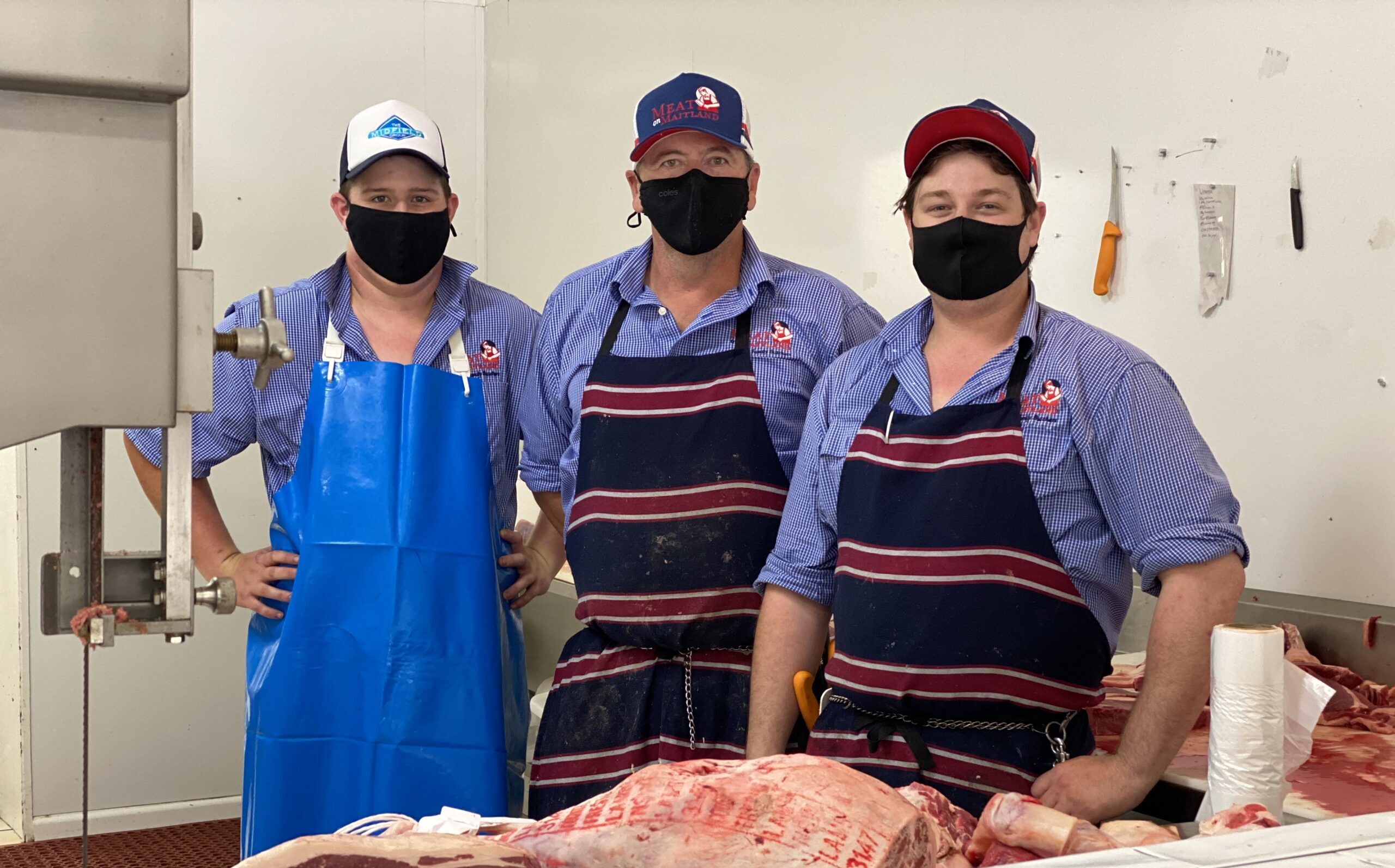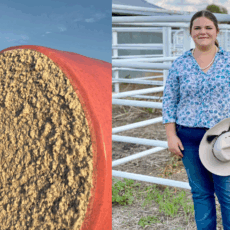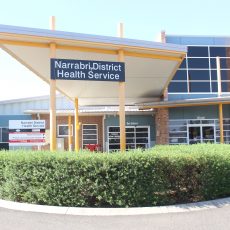As major supermarket chains grapple with the COVID-19 supply chain chaos, local small businesses such as Meat on Maitland have been working overtime to ensure they have enough produce to meet demand and insist sourcing goods locally is the key.
“Because we supply all our own beef, lamb and pork to our businesses – we’re never going to run out,” said Meat on Maitland proprietor Damian Galvin, who runs a butchery in Narrabri and Bingara with his wife Tiffany.
“I’ve got my own breeders, I’ve got my own cattle, we’ve got our own lamb producers, our own pork producers – all in Bingara, Narrabri and around the district,” he said.
“There are some shortages on a lot of products out there but we’re trying to keep the freshness here by producing all our own stuff and keeping it local, so we should be fine.”
Essentially offering a from paddock to plate experience, the front counter at the Meat on Maitland butchery is still jam-packed with prime cuts and award-winning produce.
“We’re not buying in any rubbish either, it’s all still our top-quality beef, lamb and pork,” said Mr Galvin.
“And chicken is still delivered three days a week to us.
“If we get too busy with buyer demand, of course – we can only give people what we’ve got in the shop, but there are no limits here.”
Coles supermarket chain recently introduced temporary pack limits per transaction/per customer on some products in store and online due to high demand, as well as the impacts of staff and suppliers needing to isolate due to COVID-19.
“Product availability in our stores has been impacted due to pandemic related supply chain disruptions,” said a statement released by Coles on its social media account.
Meat on Maitland proprietor Damian Galvin said he had been facing some issues with COVID-19 impacting abattoirs, but he had been working hard to organise alternatives to ensure customers can still enjoy their magnificent meat for dinner.
“We’ve had a few issues with abattoirs – many of them have been impacted by COVID so they’ve got no slaughtermen, they’ve got no killers, they’ve got no truck drivers,” said Mr Galvin.
“So there will be a lot of butcher shops in our region and all up and down the coast that can’t get meat killed.
“We’ve had to go to a country abattoir, and we’ve had to ask them if they can kill our meat for us, so we’re going to have plenty of meat – we’re not going to run out.
“I feel disappointed, there would be a lot of people out there that have been let down because I had to make all the phone calls and I had to make it all happen – people didn’t ring me and say ‘we’re going to close the abattoirs’.
“I just heard second-hand and jumped onto it and said ‘okay, we’ve got to make this happen’.
“We’re very lucky that we can put our hands on what we need every single day.”
On Thursday, January 13, national cabinet met and agreed to expand which workers should be exempt from isolation rules to ease the pressure on workforces and supply chains.
Following the meeting, on January 14, the NSW government announced critical workers from certain sectors isolating as close contacts would be permitted to leave self-isolation to attend work if they have no symptoms of COVID-19.
Workers will only be eligible to leave self-isolation if their employer determines that their absence from the workplace poses a high risk of disruption to the delivery of critical services or activities, and they are unable to work from home.
These workers must wear a mask and comply with risk management strategies put in place by their employer, including daily Rapid Antigen Tests. Any worker who tests positive or who develops symptoms of COVID-19 must self-isolate.
The new rules take effect immediately and apply to critical workers in the following sectors:
• Utilities which include electricity services, operation of energy systems, gas services, liquid fuels, water supply, sewerage, sanitation and drainage services and waste and resource recovery services (including collection, treatment and disposal services).
• Information and telecommunications.
• Social assistance and welfare services.
• Funeral, crematorium and cemetery services.
• Seaport operations.
• Air and sea freight and logistics.
• The operation of correctional centres and community corrections.
• A person employed by Resilience NSW, a member of Surf Life Saving New South Wales, Volunteer Marine Rescue NSW, or New South Wales Volunteer Rescue Association Inc.
The sectors listed above are in addition to the previously announced exemptions for:
• Agriculture (biosecurity and food safety personnel undertaking critical duties).
• Manufacturing (production and manufacturing of food, beverages, groceries, cleaning and sanitary products).
• Transport, postal and warehousing (road and rail freight, logistics, delivery and grocery fulfilment).
• Emergency services workers and healthcare workers who are necessary for the delivery of critical services and who cannot work from home.
Woolworths supermarket chain has also advised it will not print its product catalogues for the next fortnight due to COVID-19 supply chain issues.
And on January 13, Woolworths reinstated a limit of two packs per customer across toilet paper and analgesic (painkillers) products nationwide both in-store and online.
“As we welcome in 2022, it’s clear that we are entering a very different phase of COVID, not least because of the high levels of community transmission associated with Omicron,” said Woolworths Group chief executive officer Brad Banducci in a statement on January 6.
“When you’re shopping with us at the moment, you might, unfortunately, have noticed gaps on shelf, or substitutions in your online order.
“Unlike the surge buying of early 2020 (who could forget the toilet paper), this is because of the number of people in our supply chain in isolation – from suppliers to truck drivers and distribution centre team members – which in turn is causing material delays to store deliveries.
“To give you a sense of the magnitude of the challenge, we are experiencing COVID-driven absences of 20 per cent plus in our distribution centres and 10 per cent plus in our stores.
“NSW is currently the most affected, although we are seeing impacts across the whole country, and it’s not yet clear how soon the system will come back into balance as we move through the Omicron wave.
“We understand how frustrating it is when you can’t find the product you’re looking for and, together with our suppliers and supply chain partners, we’re working hard to get all products back on shelf as quickly as we can (including Rapid Antigen Tests).
“In the meantime, we have more than enough stock in the system and plenty more coming.
“We would of course also ask you to keep shopping as you normally would and to continue to show kindness to our teams.”
To order photos from this page click here










